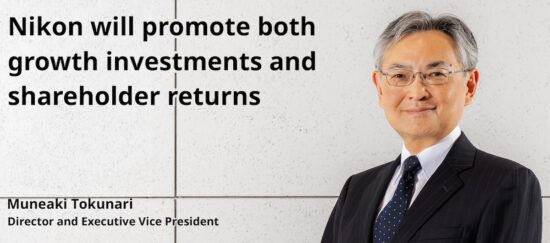
Yomiuri published an interview with Nikon’s executive Muneaki Tokunari (President/CFO/COO/CRO/Executive Officer). Here is the recap by digicame-info:
- We are now in an age where smartphones and digital cameras can coexist. Global sales of digital cameras have fallen to one-twentieth of their peak. However, domestic companies are doing well. What is going on? As I understand it, the act of taking photos has spread with the spread of smartphones. In the days of film cameras, you had to develop the film, but with digital cameras, that’s not necessary. Nowadays, you can post photos online right away, and there are social networking sites like Instagram and Facebook. I think smartphones have broadened the base. As a result, our high-end models, which are at the top of the camera pyramid, are selling well.
- Our decision to focus on mid- to high-end models, professional models, and mirrorless cameras in the 2020s has worked better than expected. The Chinese market is a typical example. Sales are high because the wealthy are looking for cameras rather than smartphones. India is also growing. The country has a large population, but there is also a large demand for weddings.
- It is difficult to capture a decisive moment with a smartphone. Smartphones have taught us the joy of sharing our shooting with the public, and the number of people using them has increased. As a result, interchangeable lens cameras are doing well, including from other companies, compared to compact digital cameras and cameras with non-interchangeable lenses.
- (Regarding the review of production bases) The purpose is to improve production capacity. To make high-precision lenses. We will invest 100 billion yen and gradually renovate our factories by 2030. First in Tochigi. Many of our lenses are made in Thailand, and high-performance lenses are produced in Tochigi.
- We have acquired Red, a US camera manufacturer. The Z mount is expected to be used in filming as well. We would like to use our channels to promote it in India, a major film nation. There is no doubt that this field is an area where market expansion is expected.
Here is the complete article transition:
Nikon President Muneaki Tokunari:
“High-end and mid-range models and professional cameras are doing well”
“Nikon acquires Red Corp., challenges the video market”
The popularity of smartphones has led to a decline in the market for digital cameras, but the sales are booming. Nikon will invest 100 billion yen in the future to review its production bases. We spoke to President Tokunari Masaaki, who is originally from a financial institution.
The camera and imaging business is doing well in China.
“It used to be a business that was operating at a loss. At the time, our competitors were also selling off their camera businesses. With the functionality of smartphones evolving, people were wondering what would become of digital cameras.
We are now in an age where smartphones and digital cameras can coexist. Global sales of digital cameras have fallen to one-twentieth of their peak. However, domestic companies are doing well. The top five companies hold most of the world’s market share. This is a rare example in Japanese industry.
What is happening? As I understand it, the act of taking photos has become more widespread with the spread of smartphones. In the days of film cameras, you had to develop the film, but with digital cameras, that’s not necessary. Nowadays, you can post photos online right away, and there are social networking sites like Instagram and Facebook. I think smartphones have broadened the base of photography. As a result, our high-end models, which are at the top of the camera pyramid, are selling well.
Our decision to focus on mid- to high-end models, professional models, and mirrorless cameras in the 2020s has worked better than expected. The Chinese market is a typical example. The wealthy are looking for cameras, not smartphones, and they are selling well. The United States is the best-selling country for cameras. Next is Europe, followed by China and Asia, but recently China has overtaken Europe.
India is also growing. It has a large population, but demand is also strong for weddings. In India, weddings are held over several days in a row, and wedding attire is changed many times. This requires marketing that is different from that in China . We will lend our cameras to professional wedding photographers and have them use them. We are also considering mounting the cameras on drones. We are conducting sales activities while considering how our cameras are being used in each country.”
Why is the camera being reconsidered?
“During the COVID-19 pandemic, when people had nothing to do but stay at home, there was interest in photography techniques around the world, including in the US Content explaining how to apply lighting was widely read.
In English, the word for shutter is “shooting,” but it also means to capture a moment or to kill a prey. I think taking pictures yourself is something that humans instinctively do. It’s hard to use a telephoto lens or capture a decisive moment with a smartphone. The (mirrorless) Z6 III has a pre-capture function, so you can take a picture even if you think it was taken a second before or a little late. If you can take hundreds of pictures per second, you can capture the moment a bird takes off.
Smartphones have taught people the joy of sharing their photography with the public, and the target audience has expanded. As a result, interchangeable lens cameras, including from other companies, are doing well compared to compact digital cameras and cameras with non-interchangeable lenses.
We are currently reviewing our production bases.
“Our goal is to improve our production capacity. We will make high-precision lenses. We will invest 100 billion yen and gradually renovate our factories by 2030. First up is Tochigi. Many of our lenses are made in Thailand, and high-performance ones are produced in Tochigi. These include large lenses that are several meters across and are used in microscope objective lenses and semiconductor exposure equipment. We want to improve quality.
Both cameras and semiconductors are becoming more and more precise, and their level of precision is increasing. Even things like dust and hairs will become visible. Of course, we are taking measures to prevent deterioration (of the factory), but the aim is to improve precision. We will also invest in areas related to the lens. This is because semiconductor exposure requires the world’s most advanced technology.
Selling in the movie powerhouse, India
We are focusing on the professional video camera market.
“We have acquired Red, a US camera manufacturer. The Z mount is expected to be used in film shooting as well. We would like to use our company’s channels to promote it in India, a major film nation. Red holds a patent for compressing video.
There is no doubt that the market in this field will expand. Not only Hollywood in the United States shoots movies, but YouTubers also shoot videos. People have woken up to the fun of it, and the number of people who can be called semi- professionals or high amateurs is increasing.
Nikon has been wanting to enter the video market for some time. Nikon, which is considered conservative in Japan, has acquired Red, which is cutting edge in Hollywood. They have sent engineers to Red and are serious about it.
Our current cameras are good enough for taking videos, but the subtleties of Hollywood movies, including the colors, are completely different. We don’t know what the final result will be, but we want to respond to the demands of those who are not satisfied with the original. We want to take one or even half a step forward while listening to our customers’ voices.”
Muneaki Tokunari graduated from Keio University Law School in 1982 and joined Mitsubishi Trust Bank (now Mitsubishi UFJ Trust Bank). He served as Executive Managing Director and Director of Mitsubishi UFJ Financial Group. He joined Nikon in 2020. After serving as Representative Director and Vice President, he became President in April 2012. He is originally from Fukuoka Prefecture. His hobby is playing the flute, which he began playing in elementary school.
Source: Yomiuri (interviewer: Hashiya Shingo)
The current Nikon rebates are set to expire on September 15th






